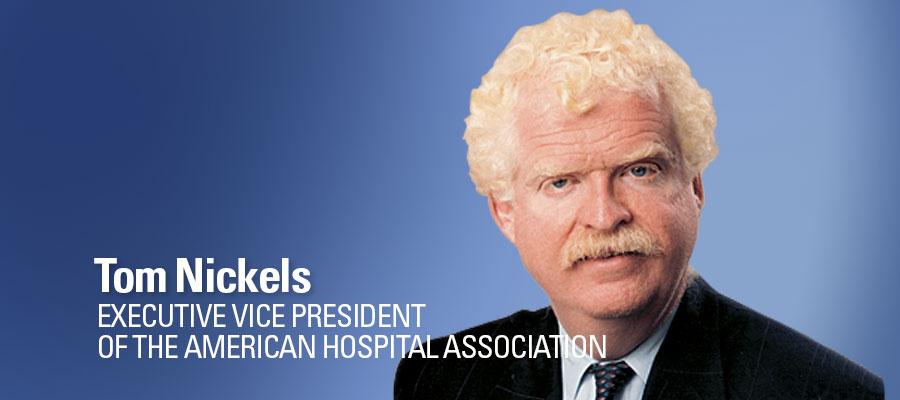What’s next for rural hospitals? Additional COVID-19 relief and beyond

As we see the number of COVID-19 cases in the country rapidly increasing again, we know the importance of passing legislation to support hospitals and health systems during this public health emergency and beyond.
While Congress took significant steps earlier this year via several COVID-19 relief bills, and AHA helped secure $10 billion in emergency relief funds targeted specifically to rural hospitals, we know more federal support is necessary … and it must happen quickly.
Rural hospitals in particular have faced unique challenges this year, and your resourcefulness and innovative spirit have stood out as you’ve adapted to preserve access to care in your communities.
In conjunction with National Rural Health Day, Nov. 19, we highlight AHA’s priorities for supporting rural health organizations.
COVID-19 Priorities
The COVID-19 public health emergency has wreaked havoc on our country and placed a tremendous strain on hospitals and health systems. The AHA has estimated over $320 billion in losses for hospitals and health systems from the start of the pandemic through the end of 2020. The frightening reality is those losses will likely continue into 2021 as COVID-19 cases increase during the winter months. And we know rural hospitals are among our most vulnerable because of systemic challenges you’ve faced for years.
Among our priorities for the next COVID-19 relief package are:
- additional money for the provider relief fund;
- federal liability protections;
- support for front-line health care workers;
- coverage for the uninsured; and
- accelerated payment forgiveness.
In addition, we are advocating for targeted rural policies, including:
Suspending critical access hospitals’ final settlement payments until 12 months after the COVID-19 emergency has ended;
- Policies that support increased bed capacity in rural areas;
- Removal of the 96-hour condition of payment; and
- Flexible rural health clinic productivity standards during emergency.
You can read more about these efforts in our recent Action Alert and updated COVID-19 relief legislation advocacy priority list.
Health Care Extenders
In addition, the AHA is urging Congress to extend certain essential provisions expiring next month, including:
Conrad State 30 program. We urge Congress to pass legislation to extend and expand the Conrad State 30 J-1 visa waiver program, which would waive the requirement to return home for a period of time if physicians holding J-1 visas agree to stay in the U.S. for three years to practice in a federally designated underserved area (S. 948/H.R. 2895).
- Eliminating cuts to Medicaid disproportionate share hospital program. We urge Congress to eliminate the $4 billion in Medicaid DSH cuts for the next fiscal year.
- Extension of Medicare sequester moratorium. We urge Congress to extend the current moratorium on Medicare sequestration, which bluntly cuts all payments to hospitals, including CAHs, by 2%.
Separate Rural Package
With nearly 1 in 5 people living in rural areas relying on hospitals to provide needed access to high-quality care in their community, it is crucial for rural health organizations to not only have the freedom and flexibility to pilot alternative payment models, but they should be incentivized to do so. We will continue advocating for a rural package; our rural policy priorities include:
- Establishing a Rural Emergency Hospital designation under Medicare. This would allow existing facilities to meet a community’s need for emergency and outpatient services without having to provide inpatient care. A REH would provide emergency services 24 hours a day, 365 days a year, and communities would have the flexibility to align additional outpatient and post-acute services with community needs and receive enhanced reimbursement.
- Reopening necessary provider designation. Congress should pass legislation to reopen the necessary provider designation for CAHs, which would allow more small and rural hospitals to receive cost-based Medicare reimbursement. Hospitals must meet several criteria, including a mileage requirement, in order to become a CAH. A hospital can be exempt from the mileage requirement if its state certifies the hospital as a necessary provider; however, the necessary provider designation expired on Jan. 1, 2006.
- Extending rural demos such as the Rural Community Hospital Demonstration Act. The RCH demonstration tests reasonable cost reimbursement for inpatient services in rural hospitals that have fewer than 51 acute-care beds, provide 24-hour emergency care services and are not designated or eligible for designation as a critical access hospital.
On this National Rural Health Day, the AHA is proud to stand with rural hospitals and health systems nationwide to preserve and increase access to high-quality, affordable care, eliminate health disparities and build pathways to recovery for a post-COVID-19 era and beyond.

